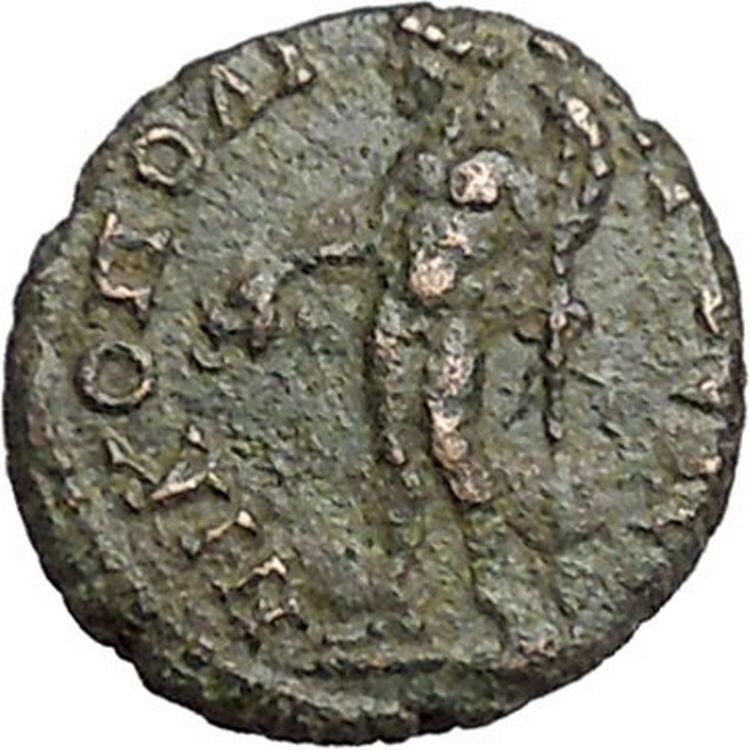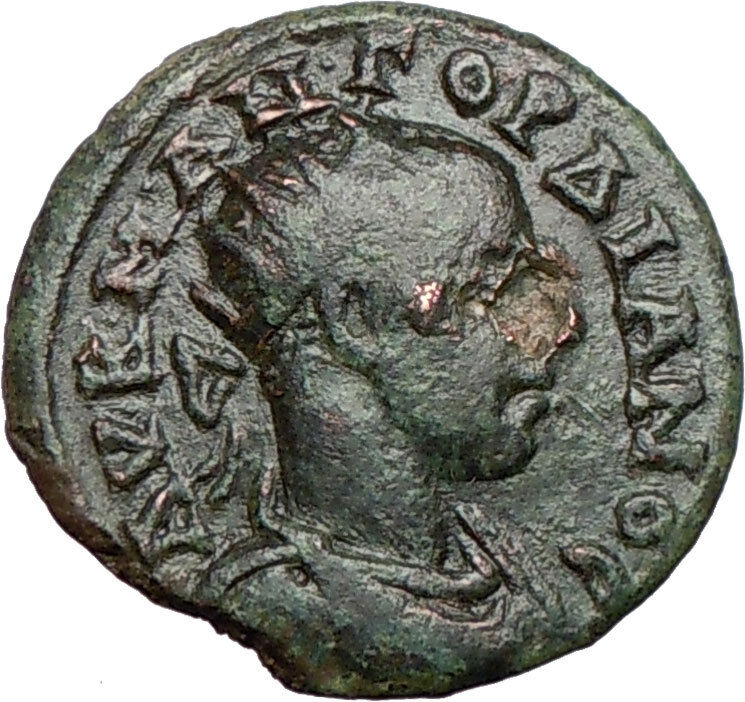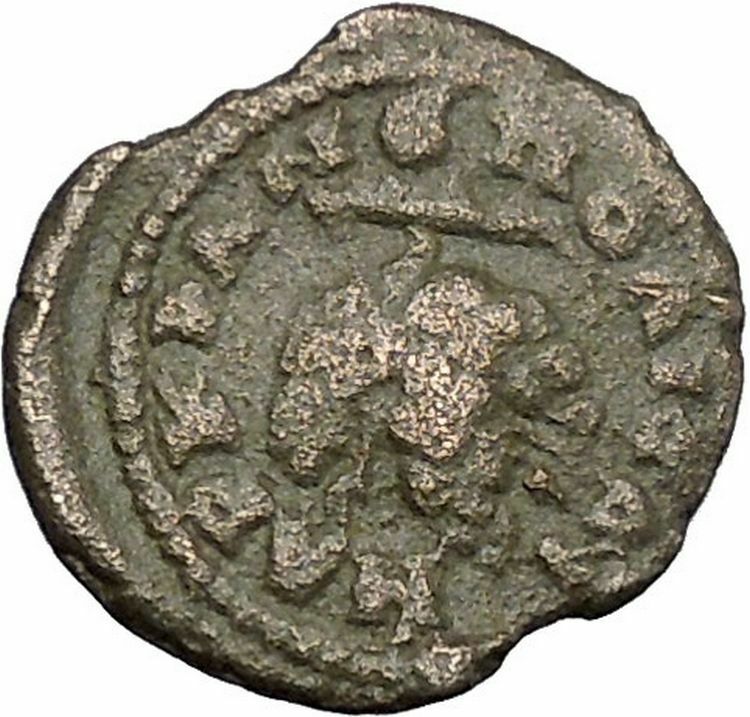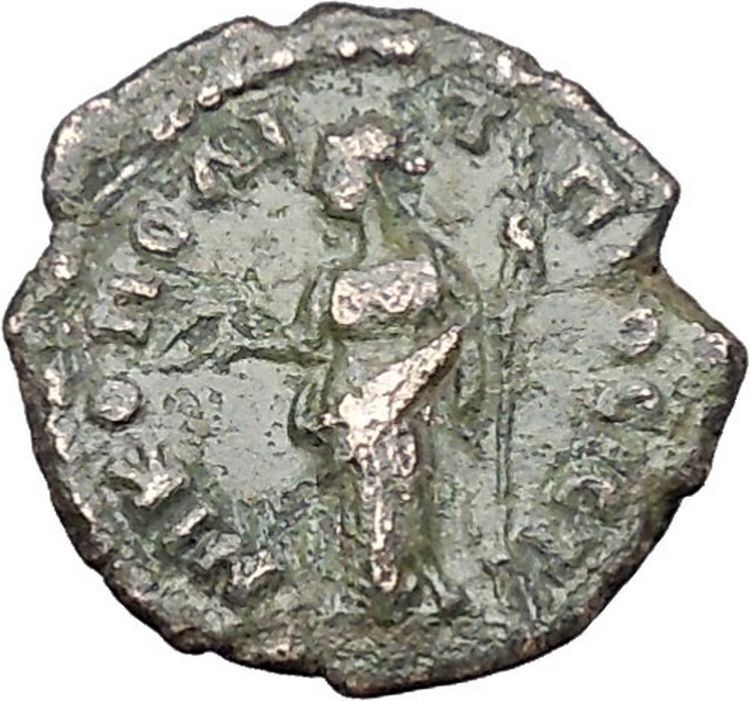|
Severus Alexander –
Roman Emperor: 222-235 A.D.
Bronze 23mm (8.03 grams) of
Caesarea in
Cappadocia
Reference: cf.
Sydenham 574
AV K CЄOVH AΛЄΞANΔP,
radiate, draped and cuirassed bust right.
MHT / POΠΟΛ / ЄΩC ΚΑI / CAPIAC / NЄΩK /
ЄTS in six lines.
You are bidding on the exact item pictured,
provided with a Certificate of Authenticity and Lifetime Guarantee of
Authenticity.

Mount
Erciyes( Mons Argaeus in ancient times) is a massive
stratovolcano
located 25 km south of
Kayseri
,
Turkey
. Erciyes is the highest
mountain
in central
Anatolia
(3,916 metres). The volcano is heavily
eroded, but may have erupted as recently as
253 BC
, as may be depicted on
Roman era
coins.
Strabo
wrote that in his time the summit was
never free from snow and that those few who ascended it could see both the
Black Sea
and the
Mediterranean
.
Kayseri, named in
classical antiquity
as Mazaka or
Mazaca, Eusebia, Caesarea Cappadociae, and later as
Kaisariyah, is a large and industrialized
city
in
Central Anatolia
,
Turkey
. It is the seat of
Kayseri Province
.
Kayseri has been a continuous settlement since 3000 BC. The city has always
been a vital trade center since it is located on major trade routes,
particularly along what was called the
Great Silk Road
.
Kültepe
, one of the oldest cities in
Asia Minor
, lies nearby.
As Mazaca, the city served as the residence of the kings of
Cappadocia
. In ancient times, it was on the
crossroads of the trade routes from
Sinope
to the
Euphrates
and from the
Persian Royal Road
that extended from
Sardis
to
Susa. In
Roman
times, a similar route from
Ephesus
to the East also crossed the city.
The city’s name was changed to Eusebia in honor of the Cappadocian
king
Ariathes V
(163–130 BC). The name was changed
again to Caesarea by the last Cappadocian King
Archelaus
or perhaps by
Tiberius
.
Mount Erciyes (Mons Argaeus in ancient
times). The site, now called the old town, diplays only a few traces from the
old town. It was destroyed by the
Sassanid
king
Shapur I of Persia
after his victory over the
Emperor Valerian I
in AD 260. At the time it
was recorded to have around 400,000 inhabitants. In the 4th century, bishop
Basil
established an ecclesiastical centre on
the plain, about one mile to the northeast, which gradually supplanted the old
town. A portion of Basil’s new city was surrounded with strong walls and turned
into a fortress by
Justinian
, was the last
Alexander Severus (October 1, 208–March 18, 235 AD), commonly
called
Marcus
Aurelius Severus Alexanderr
Roman emperor
(11 March 222–235) of the
Severan dynasty
. Alexander Severus succeeded his cousin,
Elagabalus
upon the latter’s assassination in 222 AD, and was ultimately assassinated
himself, marking the
epoch event
for the
Crisis of the Third Century
—nearly fifty years of disorder, Roman civil
wars, economic chaos, regional rebellions, and external threats that brought the
Empire to near-collapse.
Alexander Severus was the
heir
apparent
to his cousin, the eighteen-year-old Emperor who had been murdered
along with his mother by his own guards—and as a mark of contempt, had their
remains cast into the
Tiber river
. He and his cousin were both grandsons of the influential and
powerful Julia Maesa
, who had arranged for Elagabalus’ acclamation as Emperor by the
famed
Third Gallic Legion
.
A rumor of Alexander’s death circulated, triggering the assassination of
Elagabalus.
Alexander’s reign was marked by troubles. In military conflict against the
rising
Sassanid Empire
, there are mixed accounts, though the Sassanid threat was
checked. However, when campaigning against
Germanic tribes
of
Germania
,
Alexander Severus apparently alienated his legions by trying diplomacy and
bribery, and they assassinated him.
Life
Alexander was born with the name Marcus Julius Gessius Bassianus Alexianus.
Alexander’s father,
Marcus Julius Gessius Marcianus
was a Syrian
Promagistrate
. His mother
Julia Avita Mamaea
was the second daughter of
Julia
Maesa
and Syrian noble
Julius Avitus
and maternal aunt of Emperor
Elagabalus
.
He had an elder sister called Theoclia and little is known about her.
Alexander’s maternal great-aunt was empress
Julia
Domna
(also Maesa’s younger sister) and his great-uncle in marriage was
emperor Lucius
Septimius Severus
. Emperors
Caracalla
and
Publius Septimius Geta
, were his mother’s maternal cousins. In 221,
Alexander’s grandmother, Maesa, persuaded the emperor to adopt his cousin as
successor and make him
Caesar
and Bassianus changed his name to Alexander. In the following
year, on March 11, Elagabalus was murdered, and Alexander was proclaimed emperor
by the
Praetorians
and accepted by the Senate.
When Alexander became emperor, he was young, amiable, well-meaning, and
entirely under the dominion of his mother. Julia Mamaea was a woman of many
virtues, and she surrounded the young emperor with wise counsellors. She watched
over the development of her son’s character and improved the tone of the
administration. On the other hand, she was inordinately jealous. She also
alienated the army by extreme parsimony, and neither she nor her son were strong
enough to impose military discipline. Mutinies became frequent in all parts of
the empire; to one of them the life of the jurist and praetorian praefect
Ulpian
was
sacrificed; another compelled the retirement of
Cassius
Dio
from his command.
On the whole, however, the reign of Alexander was prosperous until the rise,
in the east, of the
Sassanids
. Of the war that followed there are various accounts. (Mommsen
leans to that which is least favourable to the Romans). According to Alexander’s
own dispatch to the senate, he gained great victories. At all events, though the
Sassanids were checked for the time, the conduct of the Roman army showed an
extraordinary lack of discipline. The emperor returned to
Rome and celebrated
a triumph in 233.
The following year he was called to face German invaders in
Gaul, who had
breached the Rhine frontier in several places, destroying forts and over-running
the countryside. Alexander mustered his forces, bringing legions from the
eastern provinces, and crossed the Rhine into Germany on a pontoon bridge.
Initially he attempted to buy the German tribes off, so as to gain time. Whether
this was a wise policy or not, it caused the Roman legionaries to look down on
their emperor as one who was prepared to commit unsoldierly conduct.
Herodian
says “in their opinion Alexander showed no honourable intention to pursue the
war and preferred a life of ease, when he should have marched out to punish the
Germans for their previous insolence”. These circumstances drove the army to
look for a new leader. They chose
Gaius Iulius Verus Maximinus
, a Thracian soldier who had worked his way up
through the ranks.
Following the nomination of Maximinus as emperor, Alexander was slain (on
either March 18 or March 19, 235), together with his mother, in a mutiny of the
Primigenia Legio XXII
. These assassinations secured the throne for
Maximinus.
The death of Alexander is considered as the end of the Principate
system established by
Augustus
.
Although the Principate continued in theory until the reign of
Diocletian
,
Alexander Severus’ death signalled the beginning of the chaotic period known as
the
Crisis of the Third Century
which weakened the empire considerably.
Legacy
Alexander was the last of the Syrian emperors. Under the influence of his
mother, he did much to improve the morals and condition of the people. His
advisers were men like the famous jurist Ulpian, the historian Cassius Dio and a
select board of sixteen senators; a municipal council of fourteen assisted the
urban praefect in administering the affairs of the fourteen districts of Rome.
The luxury and extravagance that had formerly been so prevalent at the court
were put down; the standard of the coinage was raised; taxes were lightened;
literature, art and science were encouraged; the lot of the soldiers was
improved; and, for the convenience of the people, loan offices were instituted
for lending money at a moderate rate of interest.
In religious matters Alexander preserved an open mind. It is said that he was
desirous of erecting a temple to the
founder of
Christianity
, but was dissuaded by the pagan priests.
Marriage
Alexander was married three times. His most famous wife was
Sallustia Orbiana
,
Augusta
, whom he married in 225. He divorced and exiled her in 227,
after her father,
Seius Sallustius
, was executed for attempting to assassinate the emperor.
Another wife was Sulpicia Memmia. Her father was a man of consular rank; her
grandfather’s name was Catulus.
|










